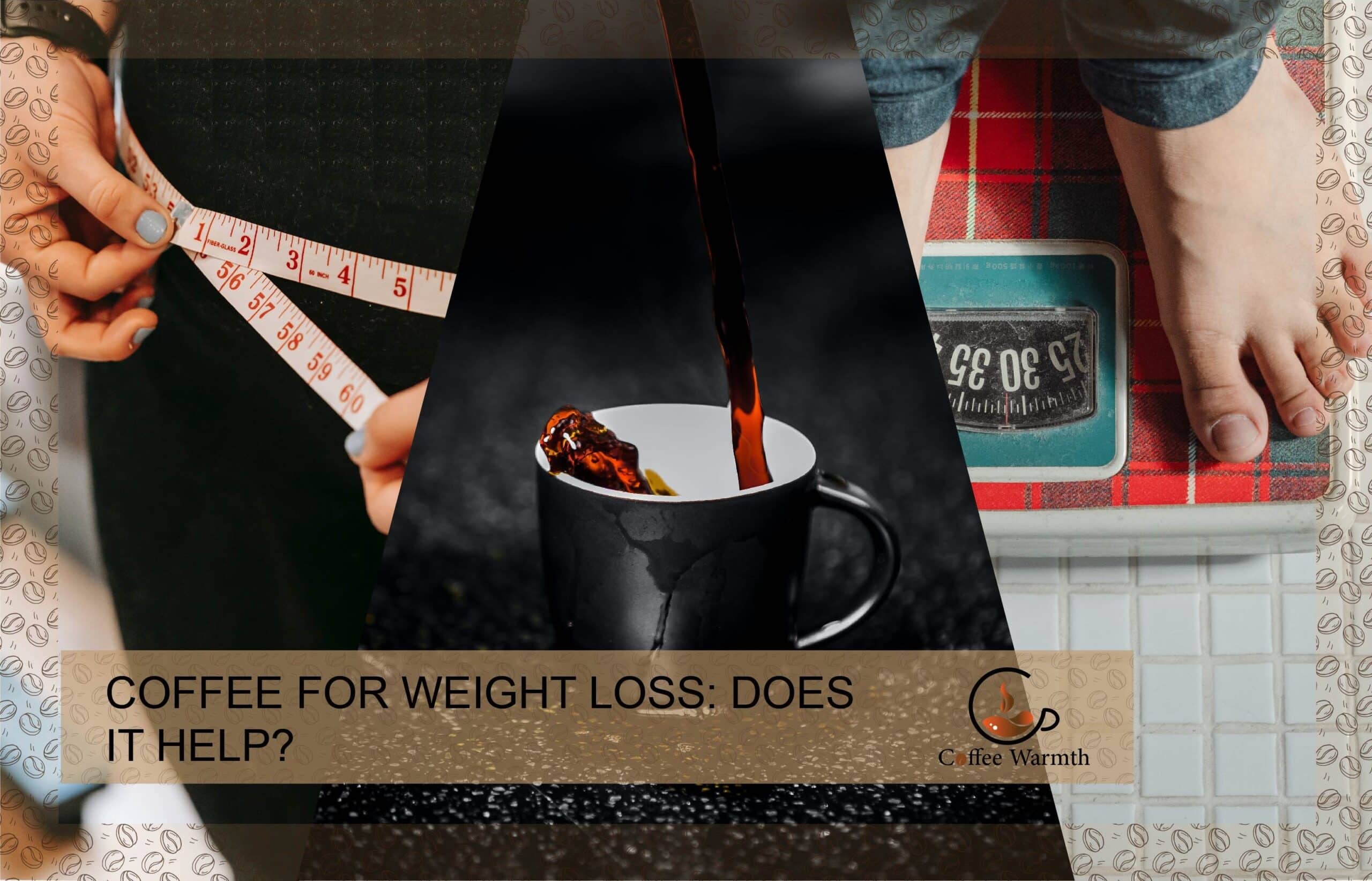Yes, drinking coffee helps with weight loss by several methods like increasing metabolic rate, burning fat, and reducing calorie intake by suppressing appetite. You can maximize these benefits by doing exercise regularly.
A study published in the ‘Obesity Research’ followed 76 obese adults for 3 months. The participants had to consume 150 mg caffeine or 1-2 cups of drinking coffee (8-16 fl.oz.). The results after 3 months showed that caffeine and coffee intake reduced weight by 6-8 kgs. The researchers found that weight loss occurred by increase in energy expenditure which led to break down of fat and heat production.
A review related to coffee consumption and obesity was published in the European Journal of Nutrition by Roseane Maria Maia Santos & Darcy Roberto Andrade Lima from South University School of Pharmacy. The authors found that caffeine and chlorogenic acids in coffee exert effects on plasma glucose levels and lipid metabolism which promote weight loss in both young and older adults.
The best time to drink coffee for weight loss is one hour after waking up, an hour after a meal, or one hour before a workout. Drinking coffee first thing in the morning or at night can impact your stress level and sleep which are associated with weight gain.
You can drink black coffee, cold brew, decaf coffee, americano, or espresso to lose weight as these coffee drinks have the least calories. Make sure not to drink coffee with milk or other high-calorie additives as they can make you gain weight rather than help lose it. You can replace high-calorie additives with honey and lemon which can give you a unique flavor while keeping the calorie count in check.
How Does Drinking Coffee Help With Weight Loss?
Drinking coffee helps with weight loss by increasing metabolic rate, suppresses appetite, and helps burn fat and calories as illustrated in the image below.
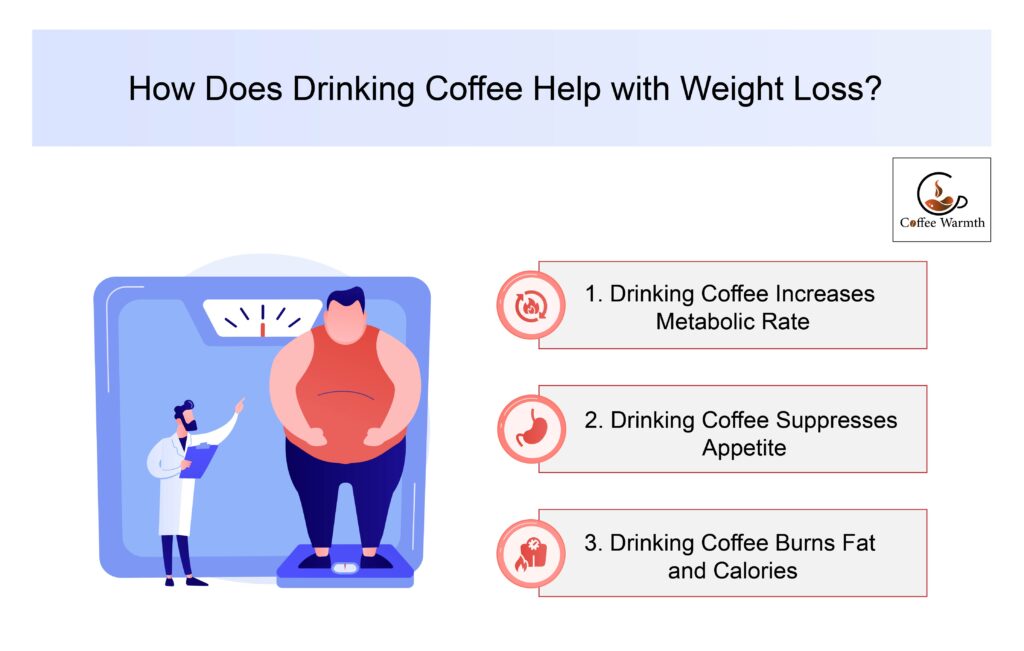
Studies from Journal ‘Plus One’, Journal of Clinical Nutrition, American Journal of Clinical Nutrition, Food Research International Journal, GSC Biological and Pharmaceutical Science, and Nutrients provide evidence for this benefit of drinking coffee.
1. Drinking Coffee increases metabolic rate
Metabolic rate means the rate at which the body expends energy or oxidizes tissue fuel to maintain the basic body functions.
Drinking coffee increases the metabolic rate at rest and during exercise which helps in weight loss. According to a study in the Peer-Reviewed Journal ‘Plus One’, drinking either caffeinated or decaffeinated coffee one hour before exercise increases metabolic rate. The authors also found that caffeine and chlorogenic acids in coffee mainly contribute to an increase in metabolism.
Studies show large doses of coffee affects metabolic rate the most. A review article in the American Journal of Clinical Nutrition states that drinking 6 cups (48 fl.oz.) of coffee regularly increases energy expenditure by 100 kcal/d due to increase in metabolism. The extra energy expenditure assists in reducing weight.
Another study by Ali Qais Abdullah of University of Diyala states 10 mg per kg or 4.5 mg/lb of caffeine or 7-10 (56-80 fl.oz.) cups of drinking coffee leads to increased metabolism by up to 13%.
2. Drinking coffee suppresses appetite
Appetite is the psychological desire for foods or beverages. Brain controls appetite through hormones leptin and ghrelin. Leptin sends signals to the brain that the stomach is full whereas ghrelin increases the appetite. This mechanism is shown in the figure.

Drinking coffee decreases appetite by increasing leptin concentrations which makes you feel full. When you feel full most of the time, your calorie intake decreases and your body breaks down fat for energy. A study in the American Journal of Clinical Nutrition found higher satiety in 76 habitual coffee consumers. Another research in the Food Research International Journal followed 90 healthy individuals drinking coffee corresponding to 500-600 mg caffeine daily for 4 weeks. The results showed a decrease in energy intake, body mass index, and regulation of satiety.
A study published in the GSC Biological and Pharmaceutical Sciences in 2022, studied the effect of 200-250 ml of coffee on appetite. The results showed that drinking coffee twice daily suppresses the appetite.
To help coffee suppress appetite for weight loss, drink coffee 0.5 to 4 hours before a meal, according to Mark Willson, psychotherapist in Washington.
3. Drinking coffee helps burn fat and calories
Drinking coffee burns fat and calories which results in weight loss. Caffeine in coffee increases cAMP (Cyclic Adenosine Monophosphate) and epinephrine, which travel to the fat tissues, signaling them to break down fats.
The process of lipolysis or fat breakdown promotes cellular metabolism. James A Greenberg, M.D., obstetrician-gynecologist in Boston, in his study suggests caffeinated coffee accelerates lipolysis more quickly than decaffeinated coffee.
Fat breakdown helps in losing weight as shown in a study published in Nutrients in 2020. The study shows that one cup of daily coffee decreased visceral fat tissue by 1.652 cm2 and visceral obesity by 25.4% in regular coffee consumers.
Another study, carried out in Parkland College, showed that one cup of coffee was responsible for burning 118.5 calories.
Thus, drinking coffee helps in weight loss by burning fat and calories and is summarized in the graphic shown.
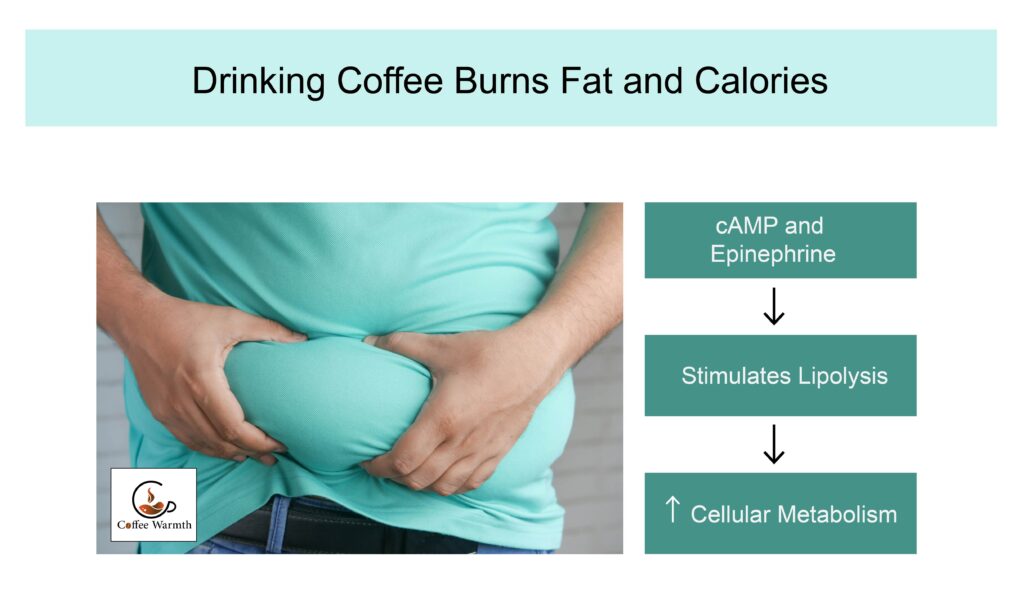
Does black coffee help you lose weight?
Yes, black coffee helps you lose weight. Black coffee is a low calorie type of drinking coffee which has only 2.4 calories in an 8 fluid ounce cup. It contains caffeine and chlorogenic acids which exert their weight loss effects. An 8 fluid ounce cup of black coffee daily can help reduce weight in the following ways.
- Caffeine in black coffee increases energy for workout and exercise.
- Chlorogenic acids in black coffee reduce appetite, reduce fat cell formation, and use stored fat as a fuel.
- Low-calorie coffee decreases daily calorie count.
Margriet S. Westerterp-Plantenga and her colleagues from the Department of Human Biology, Maastricht University investigated the effect of regular coffee intake of 1-2 cups (8-16 fl.oz.) on weight maintenance in obese individuals. They concluded that these individuals lost weight within four months of drinking 1-2 cups (8-16 fl.oz.) of coffee daily. The researchers say that these individuals lost weight due to fat breakdown and heat production.
How can drinking coffee make you gain weight?
Drinking coffee can make you gain weight due to the high calorie count of milk in coffee and high-calorie additives like sugar or cream and disruption of sleep patterns.
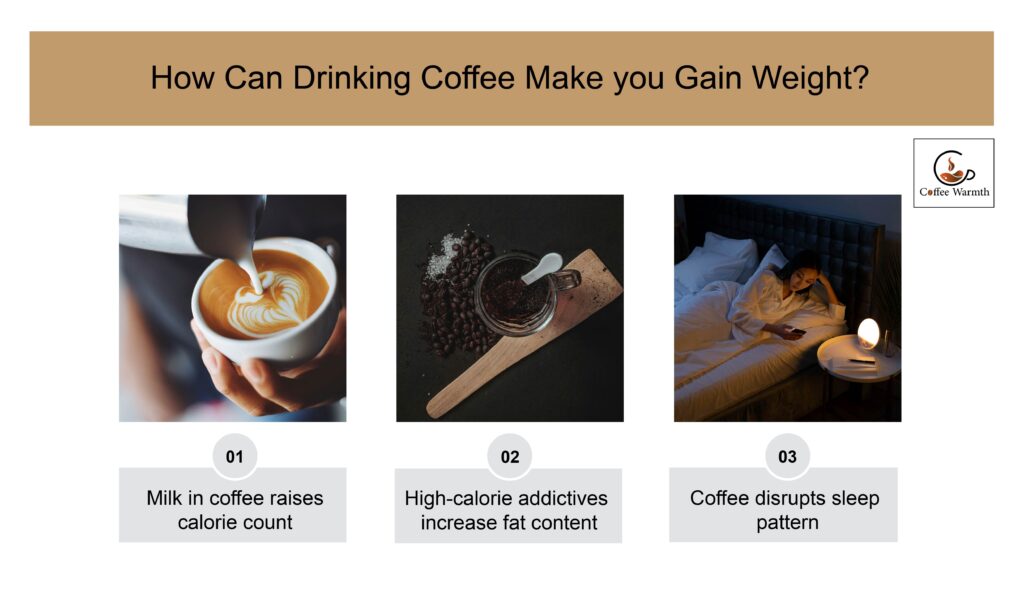
Studies in the American Journal of Clinical Nutrition, Harvard T.H. Chan School of Public Health, Journal Obesity, and Food and Function provide evidence of these claims.
1. Milk in coffee raises calorie count
Drinking coffee with milk makes you gain weight because milk raises calorie count. Milk contains macronutrients including carbohydrates, proteins, and fats, each of which provides a different amount of calories resulting in increased weight.
According to a study by the University of Illinois at Urbana-Champaign, those drinking black coffee consumed an average of 69 fewer calories per day than those who used milk and sweeteners.
The amount of calorie count varies depending on the type and amount of milk used in coffee. Skim milk (0% fat) adds 22 calories to one cup (2 fl.oz.) of coffee, reduced milk (1-2% fat) contributes 30 calories, and whole milk (3-4% fat) adds 38 calories for the same serving size.
Whole milk increases weight more than others as it contains higher fat content which increases calorie count. A meta-analysis in the American Journal of Clinical Nutrition states, using whole milk in place of reduced milk increases the likelihood of obesity by 6 times.
2. High-calorie additives increase fat content
Drinking coffee with high-calorie additives increases fat content by storing triglycerides in the fat cells. Additives like sugar, whipped cream, heavy cream, whole milk, flavored syrups, condensed milk, butter, or artificial sweeteners in drinking coffee increase calorie count.
As reported by Harvard T.H. Chan School of Public Health, drinking coffee with one tablespoon of cream, one tablespoon of sugar, and four to five tablespoons of whole milk can add more than 100 calories.
Sugar can lead to blood sugar rises and crashes resulting in a lack of sense of satiety and increasing appetite. To satisfy this increased appetite one tries to fulfill calorie count through other foods resulting in increased weight. A study published in the American Journal of Clinical Nutrition in 2023 states that adding one teaspoon of sugar to coffee daily leads to significant weight gain within 4 years.
Long time use of additives lead to metabolic adaptations making fat storage easier leading to weight gain. A study in the Polish Journal of Food and Nutrition Sciences states regular sugar intake forms triglycerides causing obesity in the long run.
3. Coffee disrupts sleep pattern
Drinking coffee may result in weight gain due to disturbance in sleep. Drinking coffee in the evening or at night can cause long-term sleep issues because caffeine in coffee promotes wakefulness and blocks sleep-promoting adenosine receptors. According to a study published in 2013 in the Journal of Clinical Sleep Medicine, drinking 4 cups (400 mg) of coffee 0, 3, or 6 hours before bedtime affects sleep.
Disruption in sleep patterns causes weight gain due to increased appetite and tiredness which may reduce physical activity. According to a systematic review in the Journal Obesity, sleep disruptions and short sleep duration is strongly associated with weight gain in both children and adults.
Coffee related sleep deprivation also results in weight gain. According to a study in the Journal Food and Function, high levels of caffeinated coffee is associated with lower sleep and increased body mass index (BMI).
What are the best coffee drinks to help you lose weight?
The best coffee drinks to help you lose weight are those with the least calories. The coffee drinks with the most calories are those with sugar, milk, cream, syrups, or artificial sweeteners. This is a list of best coffee drinks to help you lose weight along with calorie count.
| Coffee Drink | 1 Cup (fl oz) | Grams (g) | Calories |
| Black Coffee | 8 | 237 | 2.4 |
| Cold Brew | 8 | 237 | 2.4 |
| Iced Coffee | 8 | 237 | 2.4 |
| Decaf Coffee | 6 | 179 | 3.4 |
| Americano | 8 | 237 | 4.5 |
| Espresso | 8 | 240 | 21.6 |
What is the Recommended Amount of Caffeine to Lose Weight?
The recommended amount of caffeine to lose weight is 4 mg/kg body weight anytime during the day, according to the American Journal of Clinical Nutrition.
Researchers from Canada and Iran states that consuming 2 mg of caffeine per day compared to 1 mg of caffeine per day causes 22% more reduction in weight and 17% more reduction in body mass index.
Another study published in Critical Reviews in Food Science and Nutrition concludes that 360 mg caffeine promotes reduction in weight and BMI.
What is the Best Time to Drink Coffee for Weight Loss?
The best time to drink coffee for weight loss can vary depending on the individual’s routine and lifestyle. As a general rule, the best time to drink coffee for weight loss is one hour after you wake up, one hour before meal, and one hour before workout. You should avoid drinking coffee at night because it disrupts your sleep patterns which can make you gain weight.
The image below displays the best time to drink coffee for weight loss.
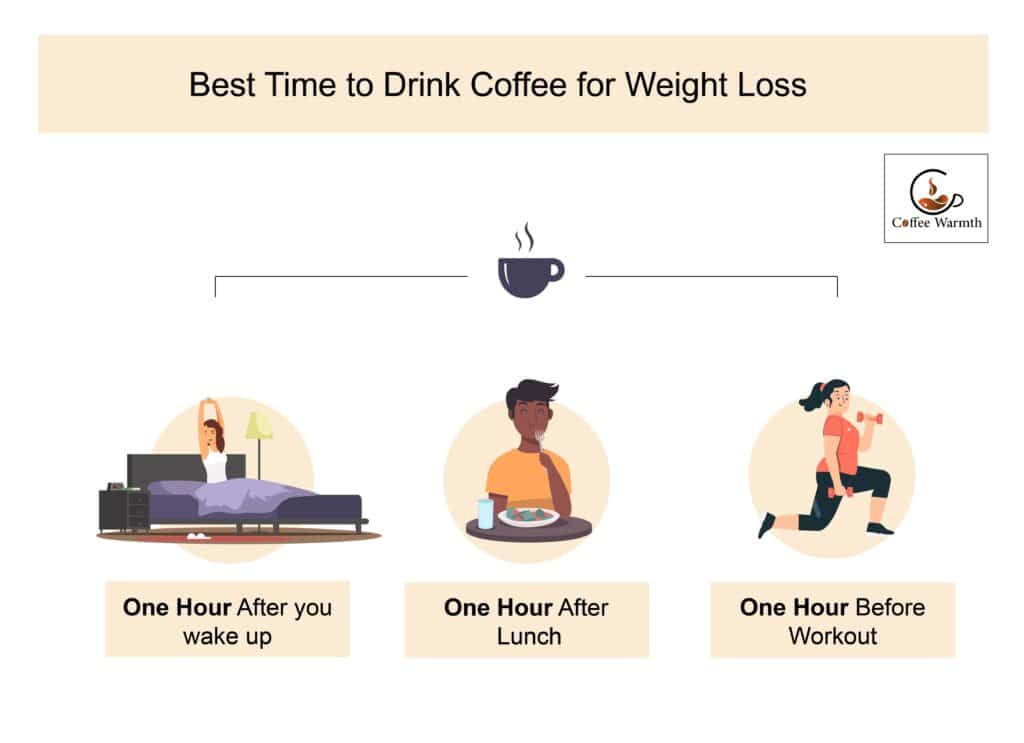
Drinking coffee in the morning helps boost the metabolic rate and burn fat and calories. So, consuming coffee an hour before workout will further increase the metabolic rate and burn calories. Coffee before a workout allows you to exercise longer with more intensity. According to a study published in Sports Medicine, caffeine dosage of 6 mg/kg of body weight 30-60 minutes before exercise promotes lipid breakdown in the body.
Drinking coffee one hour prior to meals helps regulate blood sugar level that prevents cravings of other sugar or high-calorie foods. A study in the International Journal of Food Sciences and Nutrition suggests drinking 200 ml coffee or 262 mg caffeine causes a decrease of 230 kJ in energy intake.
Should you drink coffee at night to lose weight?
No, you should not drink coffee at night to lose weight as coffee at night disrupts your sleep. Sleep disturbance can make you feel tired and hungry. Increased appetite would increase your calorie count and tiredness would not allow you to exercise daily. Both these factors can make you gain weight.
The recommended timeframe to drink coffee is shown below.
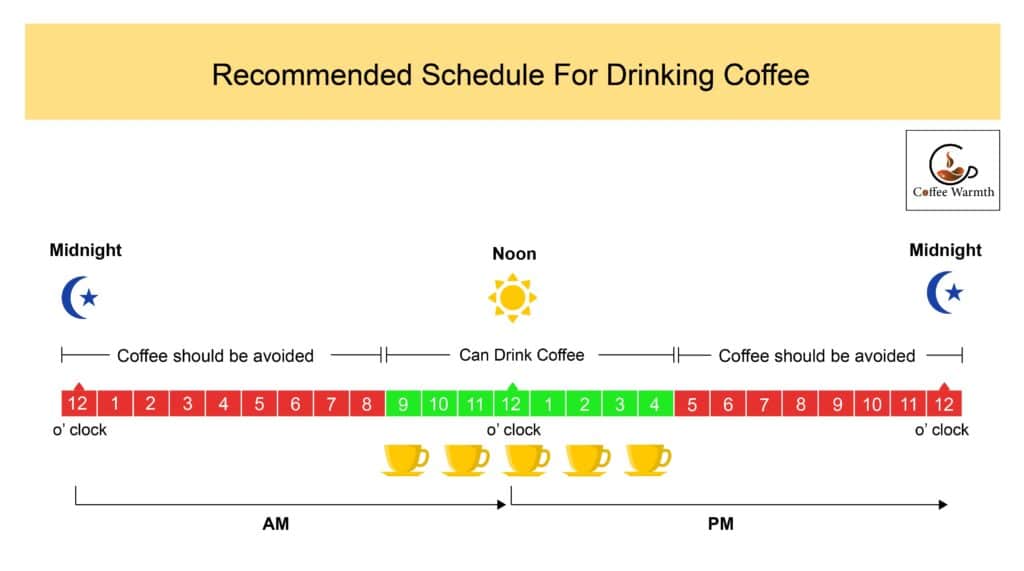
The average half life of caffeine is 5 hours in most individuals, according to the Food and Drug Administration (FDA) which means it takes about 5 hours to digest half the caffeine you consume. It is recommended to stop drinking caffeinated coffee six hours before bed to prevent any sleep irregularity, according to a study published in the Journal of Clinical Sleep Medicine.
Should you drink coffee in the morning to lose weight?
Yes, you should drink coffee in the morning to lose weight. The best time to have a cup of coffee is one hour after waking up in the morning as your cortisol levels drop after peaking early in the morning. A morning cup of coffee improves your metabolism and helps burn fat. Drinking coffee in early hours also decreases your appetite throughout the day, decreasing your food intake and helping you lose weight.
What Can You Add to Coffee to Lose weight?
You can add honey, lemon, or cinnamon in coffee to augment their natural weight loss properties according to proponents but there is no concrete evidence. Honey, lemon, and cinnamon individually help with weight loss as they promote satiety and increase metabolic rate. However, adding them to coffee does not increase their weight loss properties.
Adding lemon to coffee instead of high-calorie additives can help you lose weight. It reduces the overall calorie count but a combination of both does not augment each other’s individual weight loss benefits.
Honey in drinking coffee can increase calorie count but not as much as artificial sweeteners. According to a research published in Karger, adding honey to coffee was associated with low BMI compared to artificial sweeteners in regular coffee drinkers.
Cinnamon in coffee not only boosts flavor but also suppresses appetite and increases the rate of fat burning through thermogenesis leading to weight loss.
